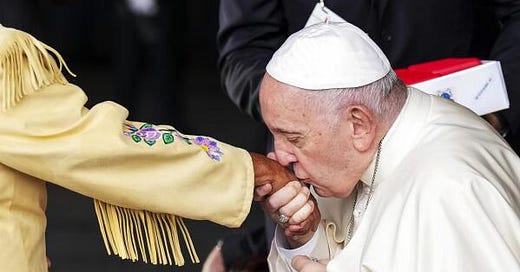Like so many, I was saddened to see the news of Pope Francis’ death this morning. It’s hard not to feel like one of the few bright candles in this dark world has been extinguished. May his memory be a blessing. May his legacy live on. May we, moved by his example, keep lighting candles in the dark.
Perhaps what I am most grateful for is Francis’ bold witness to a form of Christianity I could believe in. I am not alone in this. Phil Klay’s lovely remembrance in Vanity Fair shares the sense in which Francis’ embodiment of the Christian faith kindled a surprising hope. At the heart of his papacy was the centrality of witness. And he said that the theme of his papacy was mercy. He embodied both of these in his person. He sought out the poor. He embraced the despised. He included the marginalized. He apologized for injustice. He championed solidarity. He listened to the cries of the earth. He laughed. He hoped. He was a pastor to the world.
Pope Francis showed the world something about God that angry, exclusive, doctrinaire forms of Christianity have suppressed and forgotten: that God is Love. It is a sign of our dark times that so many people who call themselves “Christians” despise this revolutionary sentiment as soft, wishy-washy, and “liberal.” Francis was willing to risk all these criticisms and more by erring always on the side of love and mercy. The world noticed.
Francis was ever a Jesuit—in his particular attention to the poor and marginalized, but also in his intellectual curiosity. Faith seeking understanding, for Francis, was faith seeking to reckon with complexity. To be confronted by mystery. “Understanding” was not synonymous with clarity or certainty. It was one of the reasons that, in a wonderful letter on the importance of literature for priestly formation, Francis extolled the unique “wisdom” of literature:
“By acknowledging the futility and perhaps even the impossibility of reducing the mystery of the world and humanity to a dualistic polarity of true vs false or right vs wrong, the reader accepts the responsibility of passing judgement, not as a means of domination, but rather as an impetus towards greater listening.”
Pope Francis’ final encyclical was a meditation on the importance of the heart.1 It is a fitting “final word” of his papacy. There is a paragraph of Dilexit Nos (“He loved us”) that I’m hearing with fresh ears now, in the wake of Francis’ death:
“If we devalue the heart, we also devalue what it means to speak from the heart, to act with the heart, to cultivate and heal the heart. If we fail to appreciate the specificity of the heart, we miss the messages that the mind alone cannot communicate; we miss out on the richness of our encounters with others; we miss out on poetry. We also lose track of history and our own past, since our real personal history is built with the heart. At the end of our lives, that alone will matter.”
I hope at the end of his life, Pope Francis somehow knew that he had lived a life that mattered. He lived from his heart and he showed us the heart of God. He was, for so many, God’s own poiema—a poem that made us feel a little less alone in the world.
Out and About
My dear Jesuit friends at America allowed me to turn my review of Charles Taylor’s latest book, Cosmic Connections: Poetry in the Age of Disenchantment, into a broader meditation on Taylor’s legacy. You can read it now: “Charles Taylor on how poetry expresses our deepest yearnings.”
Later this week I’ll be at Providence College in Providence, RI for this year’s Veritas conference on “Transcendence in the Modern World.” I’ll give the closing keynote: “Epiphanies: Transcendence, Contemplation, and Contemporary Art.”
This will figure prominently in my revised edition of Desiring the Kingdom, the focus of my work now and through the summer.




